DUBAI: Rising floodwaters following weeks of record-breaking rainfall around the sources of the Nile have claimed more than 100 lives, disrupted power and water supplies, and forced thousands to flee their homes in 17 of Sudan’s 18 states.
Almost two months after the seasonal rains began, there is little relief in sight.
Sudan’s Security and Defense Council was forced to impose a three-month national state of emergency on Sept. 4 after the death toll neared 100.
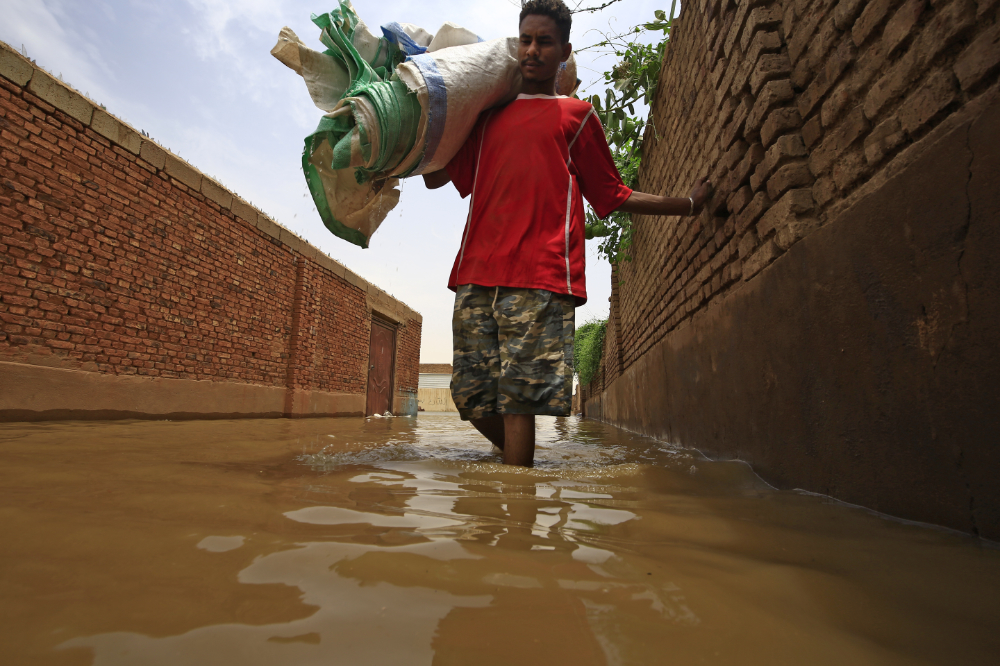
Floodwaters have damaged or destroyed more than 100,000 homes in recent weeks. (AFP)
Meanwhile, up to half a million people across the country have been directly affected, with floodwaters damaging or destroying more than 100,000 homes in recent weeks.
Heavier than usual rainfall has caused the two Niles, Blue and White, to break their banks in the capital Khartoum, where the two rivers meet. For millennia, the Nile has provided life-giving water to the deserts of northern Sudan and to Egypt, where it joins the Mediterranean Sea.
The Blue Nile supplies about 80 percent of the Nile’s water during the rainy season and reaches its maximum volume between June and September. The river is vital to the livelihood of Egypt, accounting for 59 percent of the country’s water supply, but is a major cause of the Nile overflowing its banks around this time.
The havoc in neighboring South Sudan has closely mirrored that of Sudan. Since mid-July, more than 600,000 South Sudanese have been affected by flooding in large parts of the country along the White Nile.
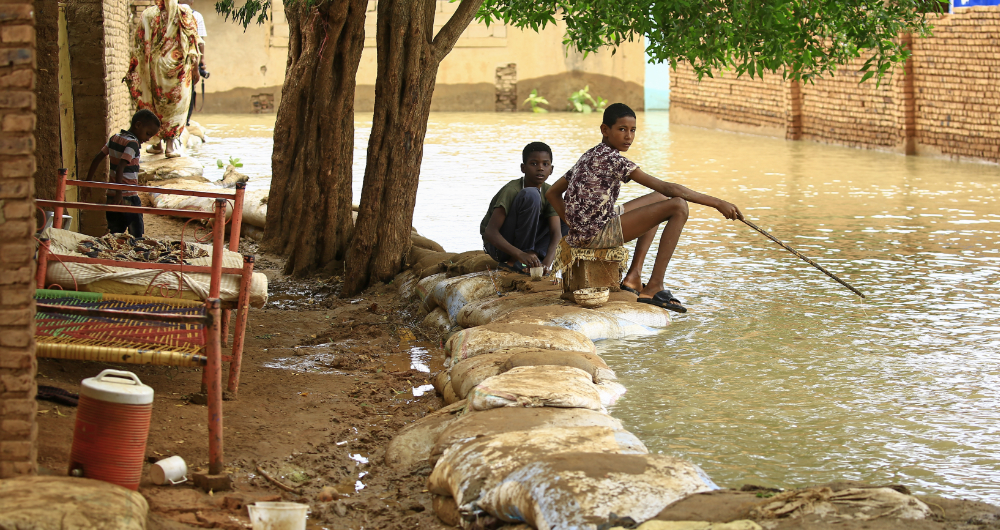
Heavier than usual rainfall has caused the Blue and White Niles to break their banks in the capital Khartoum. (AFP)
More suffering seems to be in store for the two peoples, with the rainy season expected to last till the end of October.
While Jonglei and Lakes are believed to be the worst-affected states, floodwaters have inundated large areas and settlements along the White Nile in central South Sudan. The UN Office for the Coordination of Humanitarian Affairs (OCHA) said that most displaced people have moved to higher ground near their homes and plan to return once the waters recede.
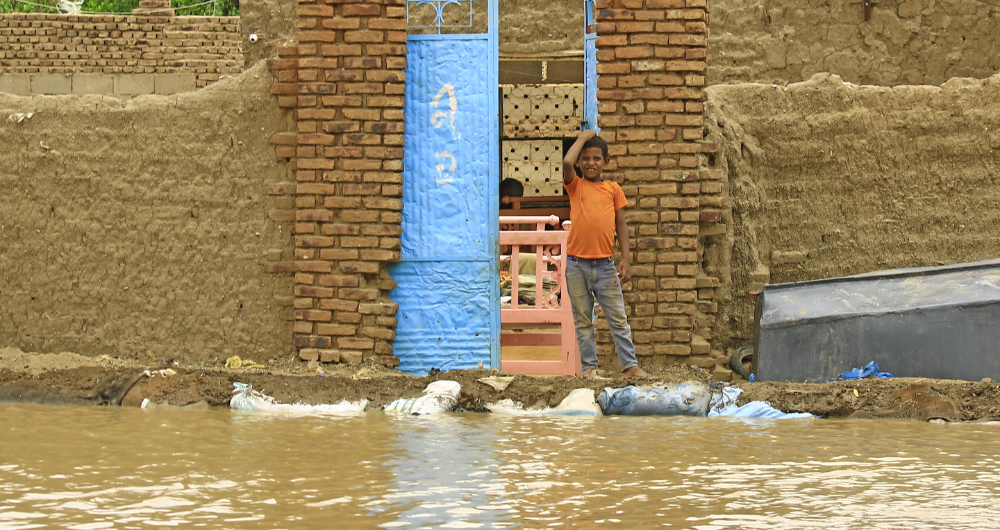
More suffering seems to be in store, with the rainy season expected to last till the end of October. (AFP)
The flooding in Sudan caused by this year’s seasonal rainfall has exceeded records set by the disasters of 1946 and 1988, according to the country’s irrigation ministry. To illustrate the severity of the situation, Yasser Abbas, the minister, pointed out that water level of the Blue Nile has reached 17.43 meters, the highest level recorded since 1912, partly due to increased rainfall in neighboring Ethiopia.
To compound Sudan’s woes, rising floodwaters resulting from continuous downpours are threatening two of its priceless archaeological sites — the ancient pyramids of Meroe on the east bank of the Nile, and the pyramids of Nuri, 350 km north of Khartoum.
SAUDI SOLIDARITY WITH SUDAN
• Saudi Arabia’s KSRelief has distributed 1,000 boxes of dates to people in the East Nile area in Khartoum state, benefiting 6,000 Sudanese.
• A Saudi plane operated by KSRelief arrived in Khartoum carrying enough supplies to help more than 30,000 people.
• Among the 90 tons of relief and food aid were 300 tents, 300 shelter bags, 1,800 blankets, 210 food baskets and 40 tons of dates.
• The aid was distributed under Saudi embassy supervision in East Nile City in Khartoum state, Umm Benin City in Sennar state, and Al-Manaqil City in Al-Jazeera state.
With forecasters predicting Sudan will experience heavy rain until the end of September, OCHA has warned of destruction over an even bigger area, as well as the spread of water-borne diseases, including cholera.
In the past two weeks, floodwaters have inundated parts of Khartoum, posing new challenges after the Sudanese military had built barricades, evacuated vulnerable neighborhoods and distributed food to the homeless. At the same time, access to clean water has become a concern as already vulnerable facilities are being contaminated by floodwater or have suffered structural damage.
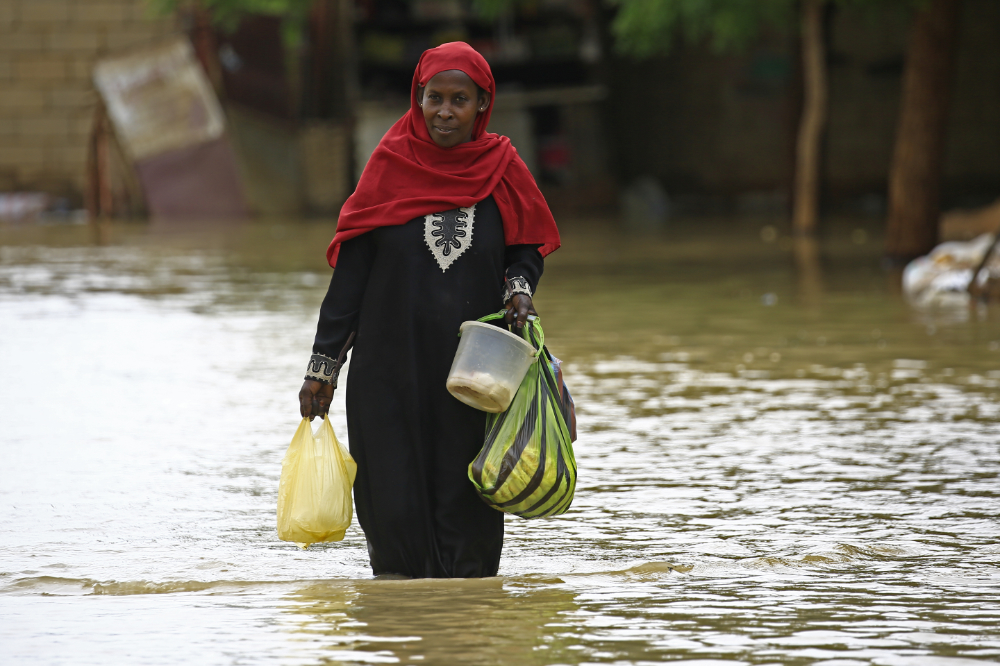
The Blue Nile supplies about 80 percent of the Nile’s water during the rainy season and reaches its maximum volume between June and September. (AFP)
According to Amani Al-Taweel, a researcher and expert on Sudanese affairs at Cairo’s Al-Ahram Strategic and Political Studies Center, flooding in the country is a far from rare occurrence, as the 1988 disaster that displaced more than 1 million people and destroyed thousands of homes shows.
Sudan failed to take routine steps to reduce the impact of heavy downpours during the rainy season, Al-Taweel said.
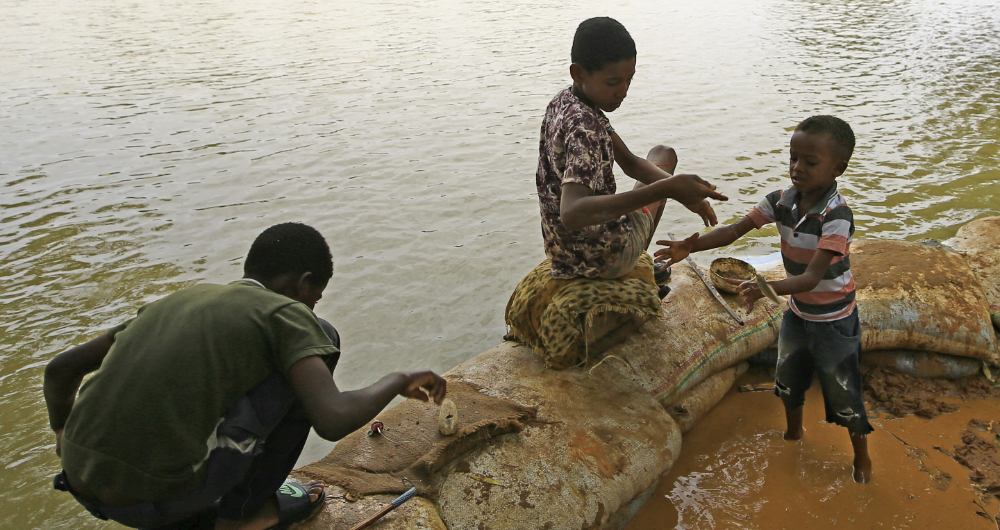
OCHA has warned of destruction over an even bigger area, as well as the spread of water-borne diseases, including cholera. (AFP)
“Rivers should have been cleared of the silt that accumulates owing to soil erosion in the Ethiopian plateau, but this did not happen,” she told Arab News from the Egyptian capital. “Sudan should have enlarged the waterways that crisscross its agriculture lands, but this, too, has not happened.”
Could Sudan have done better with regard to water storage and management?
Al-Taweel said a shortage of effective dams is partly to blame for the latest disaster, citing the Roseires and Meroe dams as examples of structures that are ill-suited to handle the heavy rainfall that Sudan is experiencing.
Unsurprisingly, the catastrophic floods in Sudan and South Sudan have stirred speculation about a possible link between the deluge and Ethiopia’s determination to push ahead with the Grand Ethiopian Renaissance Dam (GERD) on the Blue Nile. Critics of Addis Ababa’s decision to fill the GERD reservoir say it could leave the two countries even more vulnerable in future.
Ethiopia views the GERD, which is expected to generate 6,000 megawatts of electricity, as a potential game-changer for its economy. However, Egypt, which has managed to avoid flooding since it completed the Aswan Dam in 1970s, fears a potential drop in essential water supplies from the Nile.
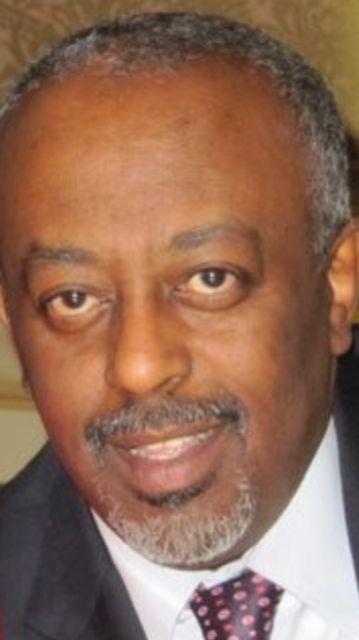
Mulugetta Ketema
In a recent interview with Arab News, Mulugetta Ketema, managing director of a US-based research and analysis institute, said that despite its recurring problem with Blue Nile flooding, Sudan has sided with Ethiopia.
“Sudan, and indeed every country, is looking at the issue only from its own national interest,” he said. For Sudan, the GERD, which is only 20 km from the border, could help to control flooding along with other benefits.
However, Al-Taweel doubts the claim. “We don’t have any details about the safety measures of the GERD,” she told Arab News. “It could drown Sudan. I doubt that the dam is a solution to the flooding problem in Sudan.”
More broadly, she said, “the hands of the current transitional council in Sudan, which is hoping to achieve a democratic change, are tied by a weak economy. And one of the reasons behind this weak economy is that Sudan is listed on the US State Sponsors of Terrorism list.
“The US was supposed to remove Sudan from that list more than a year ago because this regime is not responsible for the terrorist attacks that happened during the previous regime.”
Commenting on the relief supplies and aid being delivered to Khartoum by friendly Arab countries, Al-Taweel said that supporting Sudan’s “weak and fragile” health system is an urgent priority.
“Once the waters start to recede, we might see the spread of cholera and malaria, deadly diseases that could kill more people. The international community needs to act fast.”
Twitter: @jumana_khamis
Twitter: @jumanaalatamimi



























